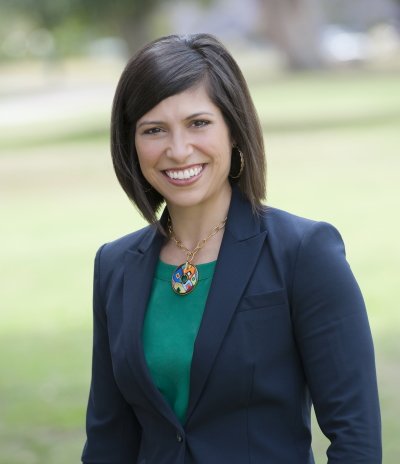Rebecca Boudreaux Ph.D, C.E.O and President of Oberon Fuels, Inc
Rebecca Boudreaux, Ph.D. is the Chief Executive Officer and President of Oberon Fuels, Inc., a California-based company making DME (dimethyl ether) as a pathway to zero-emission and carbon-neutral transportation fuel.
THE INERTIA OF SUGGESTION
I had a good idea of Rebecca Boudreaux’s background before speaking with her on September 3, 2020. She has a strong online presence, has participated in numerous interviews, and is a frequent speaker at leadership conferences. So I am not sure why I was pleasantly surprised by how easy it was to talk to Rebecca. Even over the phone, I could sense Rebecca’s positive energy, and after a couple of minutes discussing where to take a staycation in San Diego during the pandemic, I wished we were meeting in person over coffee instead of talking on a conference call.
A few weeks after our phone interview, Suburban Propane Partners, L.P. a publicly-traded company and a nationwide distributor of propane, fuel oil, and related products and services, announced its agreement to purchase a 39% stake in Oberon. As part of the transaction, Rebecca was named CEO after being President of the company for nine years. This achievement is significant and an expected trajectory for Rebecca who received her bachelor of science in Polymer Science at the University of Southern Mississippi, and a master’s degree and Ph.D. in Polymer Science and Engineering from the University of Massachusetts Amherst.
When she entered college, Rebecca’s goal was to become a nurse, but her professors encouraged her to follow a more remarkable career in science. When she applied for summer research internships at ten different schools and was rejected from seven of them, her initial reaction was a feeling of failure. Fortunately, one of the three schools that did accept her was Princeton. That period of time was significant to her, not only because she was honored to attend a prestigious educational institution, but because she realized that one could fail seventy percent of the time yet still achieve something great. I found it unusual and refreshing for her to tell me this story because most others would just neglect to say that they had been rejected at all. But she tells me that it’s the willingness to turn what could be viewed as negative into a positive which helped her get to where she is today.
PREPARING FOR THE FUTURE
Between graduation and working at Oberon Fuels, Rebecca co-founded a biotechnology company, Intezyne Technologies, which she helped grow and ultimately sell to investors. Working at Oberon and within the renewable energy space, which Rebecca has noted its differences from other technology industries, such as biotechnology. Other science-based industries typically have a specific government process to follow, and regulations and pricing are generally known. In the renewable energy industry, regulatory barriers and timelines are not often clear, requiring a number of complicated pieces to align before a project will move forward.
When Rebecca started with Oberon, DME was not on the regulatory map and there was no market for it. Oberon needed to determine and establish the regulatory framework by working with the agencies to ensure its business was supported by those who would ultimately monitor it. The company continues to spend significant resources on its consultants, such as lobbyists and publicists, to ensure the local and state governments are educated about the benefits of DME in and outside the alternative energy field. The most recent and noteworthy result was the passing of California Assembly Bill 2663. Oberon invested in the preparation, lobbying and supporting of the bill, which addressed the economic hurdle that DME was being taxed at a rate three times higher than other commercial alternative fuels such as propane, LNG, and CNG. With the help of Assemblyman Eduardo Garcia of Imperial Valley, the bill passed in September allowing for DME to be taxed competitively with other alternative fuels. As a result and to its benefit, Oberon is leading the way for these regulatory changes.
ADVICE TO WOMEN IN THE FIELD
Rebecca gave me two different pieces of advice she’d share with women who want to enter into the field. One was that a technical education was helpful in providing problem solving skills necessary to handle other aspects of her leadership roles.
The second piece of advice came in the story of how, early in her career at her biotech startup, she was selected to be the Chief Financial Officer, and because she had no financial or business background, other than having taken a few business classes, she picked up The Complete Idiot’s Guide to Accounting and learned the critical terms and main concepts of finance. Though this was an amusing anecdote, she succeeded in selling the startup by having the foresight and humility to hire people knowledgeable in the field to support her, along with a lot of hard work on her part. “It is important to remember that it’s hard for individuals to be well-rounded but it’s not hard for teams to be – if you do it right,” she said in an interview with Pedersen & Partners. This anecdote serves to give two pieces of advice – don’t be scared to take on a challenge, and surround yourself with good people to help you.
Rebecca also strongly believes in having a mentor early in one’s career. When she was climbing up her own metaphorical career ladder, she committed her personal time and money to meet people who would mentor her. These days, she finds herself more the mentor than the mentee. “I knew it was time to turn into a mentor when others asked if I could mentor them. That’s when I realized I had something valuable to share with others.”
She acknowledges that she is a rare entity and she is often the lone female in meetings at dairy farms and departments of sanitation, but she believes there is a space for everyone at the table.
LOOKING BEYOND THE PANDEMIC
Oberon recently achieved a grant from the California Energy Commission, which allows the company to set up a demonstration project at its Imperial Valley Facility to provide fuel to commercial vehicles as a test case for DME to be a viable alternative low carbon fuel. The plant is expected to produce 1.6 million gallons of DME from more than 5,500 metric tons of waste material when operating at full capacity. Aside from being dedicated to her company’s mission of decarbonizing transportation, it’s certain Rebecca is setting up to do more bold things because that is who she is. She told me she sees running a business during a pandemic as a test of how her company can thrive in this environment. And as Oberon continues to create opportunities in a region with one of the highest unemployment rates in the state by providing family wage jobs and full benefits for its newly hired employees, and as it continues to lead and change the regulatory framework for renewable transportation fuel, I look forward to seeing Rebecca succeed as its new CEO.
WORDS FOR THE FUTURE
Since I interviewed Rebecca before she became the CEO of Oberon, I asked she provide a follow-up statement on this new role.
“I am honored to have been named as CEO. It is a tribute to my parents and mentors who invested heavily in my development, and this promotion comes at a time where we have so much momentum as a company – from technology to partnerships, funding, and a marketplace that is ready and eager for our product. We are closer than we have ever been to deliver on our mission of decarbonizing transportation.”

